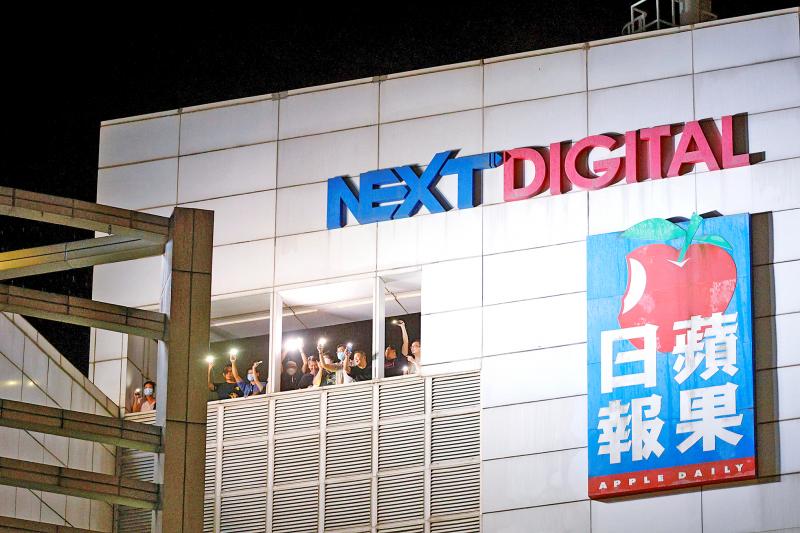Hong Kong-based Next Digital Ltd (壹傳媒), owned by jailed media tycoon Jimmy Lai (黎智英), is ceasing operations from today after the company’s assets were frozen as part of a national security investigation, according to an internal memo seen by Reuters.
Next Digital did not immediately respond to a request for comment.
The firm is the publisher of Apple Daily, a popular pro-democracy newspaper that closed last week after its newsroom was raided by 500 police officers investigating whether some articles breached the National Security Law.

Photo: Reuters
Beijing imposed the legislation in Hong Kong on June 30 last year. It defines and prohibits acts of secession, subversion, terrorism and collusion with foreign forces, with sentences of up to life in prison.
The Next Digital memo, shared separately by two employees, said that assets linked to the company remained frozen under the investigation.
Dated yesterday, the memo was addressed to all Hong Kong staff from the board.
“The group will cease operations,” it said. “Although the road ahead is difficult, continue to move forward.”
The Hong Kong Security Bureau, which directed the asset freeze, did not immediately respond to a request for comment.
Lai, a staunch Beijing critic, was arrested last year on suspicion of colluding with foreign forces. He is serving a prison sentence for taking part in illegal assemblies during Hong Kong’s mass democracy protests in 2019.
Next Digital, which had a market capitalization of HK$765 million (US$98.5 million), said in a statement to the Hong Kong Stock Exchange on Tuesday that it had accepted a proposal to divest Amazing Sino International Ltd, which operates the online edition of Taiwan’s Apple Daily.
It had earlier ceased printing its Taiwan edition, blaming declining advertising revenue and difficult business conditions in Hong Kong linked to politics.
Next Digital said in a statement on Tuesday that it has begun negotiations with “a potential purchaser” for Amazing Sino and its subsidiaries, which publish the digital version of Apple Daily in Taiwan.
“The parties have agreed to work toward signing definitive transaction agreement[s] on or before 30 July 2021 or such later date as may be mutually agreed,” the statement said.
Next Digital said the potential buyer is “a third party independent of” Next Digital, without sharing further details.
Additional reporting by CNA

President William Lai (賴清德) yesterday criticized the nuclear energy referendum scheduled for Saturday next week, saying that holding the plebiscite before the government can conduct safety evaluations is a denial of the public’s right to make informed decisions. Lai, who is also the chairman of the Democratic Progressive Party (DPP), made the comments at the party’s Central Standing Committee meeting at its headquarters in Taipei. ‘NO’ “I will go to the ballot box on Saturday next week to cast a ‘no’ vote, as we all should do,” he said as he called on the public to reject the proposition to reactivate the decommissioned

In his National Day Rally speech on Sunday, Singaporean Prime Minister Lawrence Wong (黃循財) quoted the Taiwanese song One Small Umbrella (一支小雨傘) to describe his nation’s situation. Wong’s use of such a song shows Singapore’s familiarity with Taiwan’s culture and is a perfect reflection of exchanges between the two nations, Representative to Singapore Tung Chen-yuan (童振源) said yesterday in a post on Facebook. Wong quoted the song, saying: “As the rain gets heavier, I will take care of you, and you,” in Mandarin, using it as a metaphor for Singaporeans coming together to face challenges. Other Singaporean politicians have also used Taiwanese songs

US President Donald Trump on Friday said that Chinese President Xi Jinping (習近平) told him China would not invade Taiwan while Trump is in office. Trump made the remarks in an interview with Fox News, ahead of talks with Russian President Vladimir Putin over Moscow’s invasion of Ukraine. “I will tell you, you know, you have a very similar thing with President Xi of China and Taiwan, but I don’t believe there’s any way it’s going to happen as long as I’m here. We’ll see,” Trump said during an interview on Fox News’ Special Report. “He told me: ‘I will never do

CLAMPING DOWN: At the preliminary stage on Jan. 1 next year, only core personnel of the military, the civil service and public schools would be subject to inspections Regular checks are to be conducted from next year to clamp down on military personnel, civil servants and public-school teachers with Chinese citizenship or Chinese household registration, the Mainland Affairs Council (MAC) said yesterday. Article 9-1 of the Act Governing Relations Between the People of the Taiwan Area and the Mainland Area (臺灣地區與大陸地區人民關係條例) stipulates that Taiwanese who obtain Chinese household registration or a Chinese passport would be deprived of their Taiwanese citizenship and lose their right to work in the military, public service or public schools, it said. To identify and prevent the illegal employment of holders of Chinese ID cards or